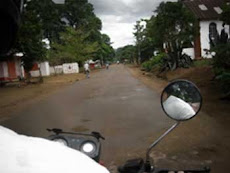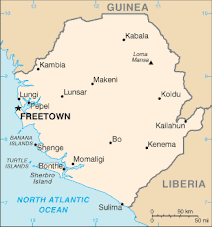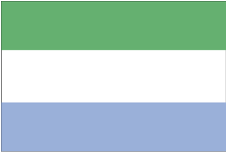 Six of us set out on a great adventure to Bonthe Island. We were armed with a satellite printout of the Island, about 40 klms east to west and 20 klms at the thickest part. No one knew much about the island, but by looking at the map, we were surely able to reach the big south beach from the main town, Bonthe, situated on the northeast side. Why not? If we see some wildlife and villagers on the way, it’d be a bonus.
Six of us set out on a great adventure to Bonthe Island. We were armed with a satellite printout of the Island, about 40 klms east to west and 20 klms at the thickest part. No one knew much about the island, but by looking at the map, we were surely able to reach the big south beach from the main town, Bonthe, situated on the northeast side. Why not? If we see some wildlife and villagers on the way, it’d be a bonus.It’s not easy to travel in Sierra Leone. The roads are terrible and the transportation options are limited to a) taxi – not good for country roads, b) poda-poda – a minivan retrofitted to carry 30 people not including roof capacity, and c) SUV – hiring an SUV is expensive and out of our price range. (Photo: In God We Trust - Osman's Poda-Poda parked on the road to Matru. James looking for a place to pee)
A last minute deal broke the night before we left that would get us an SUV with a driver to take us to Matru – an estimated 8-hour drive. From Matru we’d take a 4-hour boat ride to Bonthe Island. It would be nice to drive do
 wn in relative luxury for what seemed like a good bargain.
wn in relative luxury for what seemed like a good bargain. At 7am the driver arrived with the SUV. It was way too small for us. This sparked a 3-hour circus that had us arguing with several people involved with the rental outfit. They brought us an older SUV with retrofitted seats in the trunk space and a hole in the muffler. We all went down to the “garage” to get the muffler fixed. In our wisdom we refuse to pay a cent until the vehicle is fixed. They accused us of being stubborn white people. We were getting pissed because our great adventure was becoming derailed. We said “we’ll give you white person money if you give us white person service.” It was getting nasty. (Photo: Bonthe Island swamp bridge)
In the end, the repair was inadequate and they would not bargain the price down. So we walked. After an hour of trying to find someone to take us to Matru we met Osman, an older fellow – the best drivers to deal with. He agreed to take us to Matru in his poda-poda for 300,000 leones, a bargain.
50 klms of paved road gave way to dusty, dirty roads filled with potholes. Sticking your head out the window to catch the cool breeze seemed like a good idea until I noticed I was covered in dust. At Moyamba we ate lunch. Some of us already a bit travel weary and dehydrated.
Along the way we pass several villages wh
 ile kids wave as we pass by. At junctions our driver stops to ask villagers the way to Matru. The odd person will offer groundnuts or bread for sale.
ile kids wave as we pass by. At junctions our driver stops to ask villagers the way to Matru. The odd person will offer groundnuts or bread for sale.After crossing a river on a precarious ferry, we finally reach Matru. The sun is almost down. I make a courtesy call to a colleague. He lives here, and said he could find us a place to stay if needed. He arrives in a minute and points us to the guesthouse across the street. The tough part about dealing with Africans is that they assume all white people have tons of money. So I was worried that Joseph would set us up with an expensive place, when we were prepared to sleep under a tree. However the guesthouse was clean and cheap – 15,000 leones (about $5) (Photo: Osma's Poda-poda coming of the ferry in Matru)
The theme of the trip started taking shape. Don’t believe anything anyone says. Go with your gut instinct.
“When do the boats leave for Bonthe Island?”
“Around 11am”.
This was disappointing because we hoped to start our trek across the island that day. “Can we leave early, like 7 am?”
“Yes, charter!”
Charter is the kiss of death. This means that a white man will pay big bucks to charter a boat that would normally carry several dozen Africans.
“No charter”
“OK, ok”
With this much information we head down to the pier around 8 am. Of course we stop for breakfast. Groundnut stew with fish. Kids stand watching in amazement as we dine with their fathers.
 We ask if we can “snap” (Take a picture). Everyone is all smiles.
We ask if we can “snap” (Take a picture). Everyone is all smiles.Once at the peer we confirm the boat leaves at 11ish. We hangout at the market where about 4-dozen kids follow us everywhere we go. (Photo: Rusty boating in Bonthe)
The 4-hour boat ride to Bonthe is packed but pleasurable. We get to mingle with the locals and watch villages pass along the way. Kids standing with spears waving as we pass. A few stops, much like highway 401 rest stops, where ladies sell bananas, plantains and of course fish to passengers.
We reach the town of Bonthe. It’s shore lined with several rusted out old ships. The village is beautiful. Straight footpath streets lined with palm trees and classic mud huts. The main
 street is home to old colonial buildings and many abandoned factories. There is “the Complex”, the only upscale resort on the island. They have cold water and real toilets. As white people, this is where we are ushered first. As we see the gate, we quickly turn back to the real end of town. At “the Complex” people arrive on “charter” speedboats or helicopters and don’t leave the compound. (Photo: Blacksmith making cutlasses)
street is home to old colonial buildings and many abandoned factories. There is “the Complex”, the only upscale resort on the island. They have cold water and real toilets. As white people, this is where we are ushered first. As we see the gate, we quickly turn back to the real end of town. At “the Complex” people arrive on “charter” speedboats or helicopters and don’t leave the compound. (Photo: Blacksmith making cutlasses)Nadia averages about 4 guests per month. Now this is where we want to stay! The sun is low, and we’ve got a lot of organizing to do before tomorrow’s big adventure. We start with Nadia. She has lived here all her life.
“We want to walk to the south part of the island. To the beach.”
“You can’t do this. Only by charter boat.”
“No charter. We want to walk there”
“No. Impossible.”
Remember, don’t believe anything anyone says.
 I don’t believe this for a minute. But after a couple of hours of interviewing several locals around the guest house, we get the same answer. Can’t walk there. It’s impossible.
I don’t believe this for a minute. But after a couple of hours of interviewing several locals around the guest house, we get the same answer. Can’t walk there. It’s impossible.It’s now dark. Moral of the group is low. We face the prospect of just hanging out in Bonthe, which is not bad at all. Just not very adventurous. Some of the group is willing to charter a boat to nearby turtle islands, an expensive 4-hour boat ride. I propose walking as far as we can, using the sun and a compass as a guide. No joke. Julian and Silas are game. So we set off looking for machetes, coconuts (we brought rum) and a local guide. The market was closed. It’s dark and the streets are spotted with candle lights. Very majestic. Surreal. This is when we run into Alpha. (Photo: Me and Silas with the blacksmith and our new cutlasses)
“Evenin. How de bodi, ya?”
“Fine”
“Watin na yu nam?”
“Alpha”

“Alpha, can you take us to the south beach?”
“Yes”
“We wan fo waka na beach”
“Yes, I can take you to DINGA”
Dinga was the magic word. A village that no one else had mentioned. (Photo: Julian and Super Pikin go to fetch water)
“Alpha, we wan fo buy cutlass (machete)”
“yes”
“you will take us there right now?”
“yes”

Alpha takes us to see a man about a cutlass. He will have two ready for us by 7am. Alpha is golden. We are all now super excited.
The sun is ready to rise the next morning. I take a bucket shower and pack my bag. The boys all spill out one by one. Alpha shows with his older brother Cru.
The sun is rising as we reach the cutlass house. In the back he is working on the final touches of our handmade machetes. The process was fascinating. He was molding and cutting steel with crude instruments and parts from old cars and ships. His kids stoked the fire as he worked the metal. The day was starting like a storybook. (Photo: Death Valley. A couple hours on the open plain at 38 degrees.)
Or guides walked us out of the village past an old airstrip with an old rusted out plane on the overgrown runway. For those who know me w
 ell, you know that I an in heaven already. Old buildings, ship wrecks and rusted out planes. I love this stuff. This island is my dream amusement park.
ell, you know that I an in heaven already. Old buildings, ship wrecks and rusted out planes. I love this stuff. This island is my dream amusement park.Every half hour or so, we would come across a village. It is customary to locate the chief and introduce yourself. This goes well almost all the time. In many cases the chief sends a scout with us to point us in the right direction. Sometimes the chief wants something, like the drunk chief who insisted on drinking from our precious water supply. (Photo: Swamp walk. Aplha in forground)
We’d often meet villagers on the path. Some scared. Some excited to see white people. At one stop we traded Pringles for Bamboo wine. It would have made a great Pringles commercial.

We hear monkeys but cannot spot them. Alpha isn’t keen to stick around when he recognizes the sound of a big monkey.
Then we reached the swamp. Stripped down to the undies and walk through. No one mentions crocodiles. It was enthralling. But the next one was longer, deeper and less exciting. It allowed for more time to think about crocs. (Photo: Walking around mangrove on the way home)
The variety of vegetation gave the impression that the Island was set up by Disney land. Every 2 to 4 klms the landscape changed from sand to swamp to jungle to open plain. The open plain was tough. I was dragging a bit. It was getting hot and the sun was almost unbearable. I kept imagining a lion running at me from the distance. I would be toast, even with my machete. I told everyone that I wanted it to open coconuts, but the truth is I wanted it for protection against snakes
 and crocs. But a lion. At this point, I wouldn’t even put up a fight! (don’t worry mom, there are no lions on the island. So they say)
and crocs. But a lion. At this point, I wouldn’t even put up a fight! (don’t worry mom, there are no lions on the island. So they say)At one village we gain two more guides. A little boy, later branded Super Pikin (Child) and his older brother. They know this part of the island better than Alpha and Cru. (Photo: Super Pikin catching a wave)
After about 5 hours of hiking we make it to the ocean. A beautiful site. We all jump into the ocean. The beach ran in each direction as far as the eye could see. Barren, save for a few clusters of huts and a nearby village. We soon attract a crowd, and bargain to setup cam
 p at a half-built hut, not in use.
p at a half-built hut, not in use.We may have been high on emotion, or stupefied from overexposure to the sun, but something told us it would be a good idea to ride the giant waves. The beach was steep, and the waves smashed you down about 10 feet to the sand. I bruised my heal and James lost his glasses. I noticed Alpha was not a good swimmer, but he and many villagers joined us swimming all afternoon. That evening we gathered from Alpha’s swollen eye that he was abused by the sea. His older brother was passed out in the hut for hours, exhausted from the trip, and/or lack of water. We joked that we were abusing our guides. Think it was partly true. (Photo: The destination - the beach)
The villagers brought u
 s fresh fish. We feasted on fish and rice as a crowd watched our every move. We had to boil water from a nearby pond for our return journey tomorrow. The finished product was disgusting. Yellow pond water, with floaties that tasted like smoke.
s fresh fish. We feasted on fish and rice as a crowd watched our every move. We had to boil water from a nearby pond for our return journey tomorrow. The finished product was disgusting. Yellow pond water, with floaties that tasted like smoke.We slept under mosquito nets within the shell structure of the hut. We had clothes and tools littered all over the place. I awoke in the middle of the night. It felt like rain on my face. But there were no clouds in the sky. Then I saw someone with a long stick reaching in our hut to steal Julian’s pants! I got up and yelled “Hey!” He ran away. (Photo: Our temporary home with village onlooker)
In the morning we realize a hat and a couple other things had gone missing. And that Alpah may have a concussion.
Super Pikin was fearless. He was the most resilient of the guides. He never got tired. He fetched the water and was everyone’s whipping boy. When asked how old he was, he could not say. Guess they don’t celebrate birthdays in the bush. I’d guess around 8 years old.
The Super Pikin ate enough food for all of us and started us toward home. We took a diffe
 rent route, which brought us to new villages on the ocean. Some of the chiefs were a bit more hardball on this path. Guess they would see more rich white yacht types on the east side. We had to trade 3 candles and a glass of rum for passage through one village. (Photo: Grant feeds our food)
rent route, which brought us to new villages on the ocean. Some of the chiefs were a bit more hardball on this path. Guess they would see more rich white yacht types on the east side. We had to trade 3 candles and a glass of rum for passage through one village. (Photo: Grant feeds our food) We made it back before dark fall. Nadia made us groundnut stew with fish. At night I had dreams of insects crawling into my nose. I couldn’t sleep and I was nauseous.
We made it back before dark fall. Nadia made us groundnut stew with fish. At night I had dreams of insects crawling into my nose. I couldn’t sleep and I was nauseous.In the morning I awake to the worst scenario. At the start of a long, grueling and uncomfortable trip home, I am sick. Food poisoning? Sun stroke? Dehydration? Maybe all three!? Not good timing. During a 14-hour journey home, I could care less what people think. I snuggle up to crabs and chickens on the floor of the boat. In the back of a police truck (they need to supplement their income somehow) I pray not to poop my pants or puke on the officer driving. A flat tire, but now puke. I made it alive. (Photo: Our guides eat dinner on a Frisbee)









